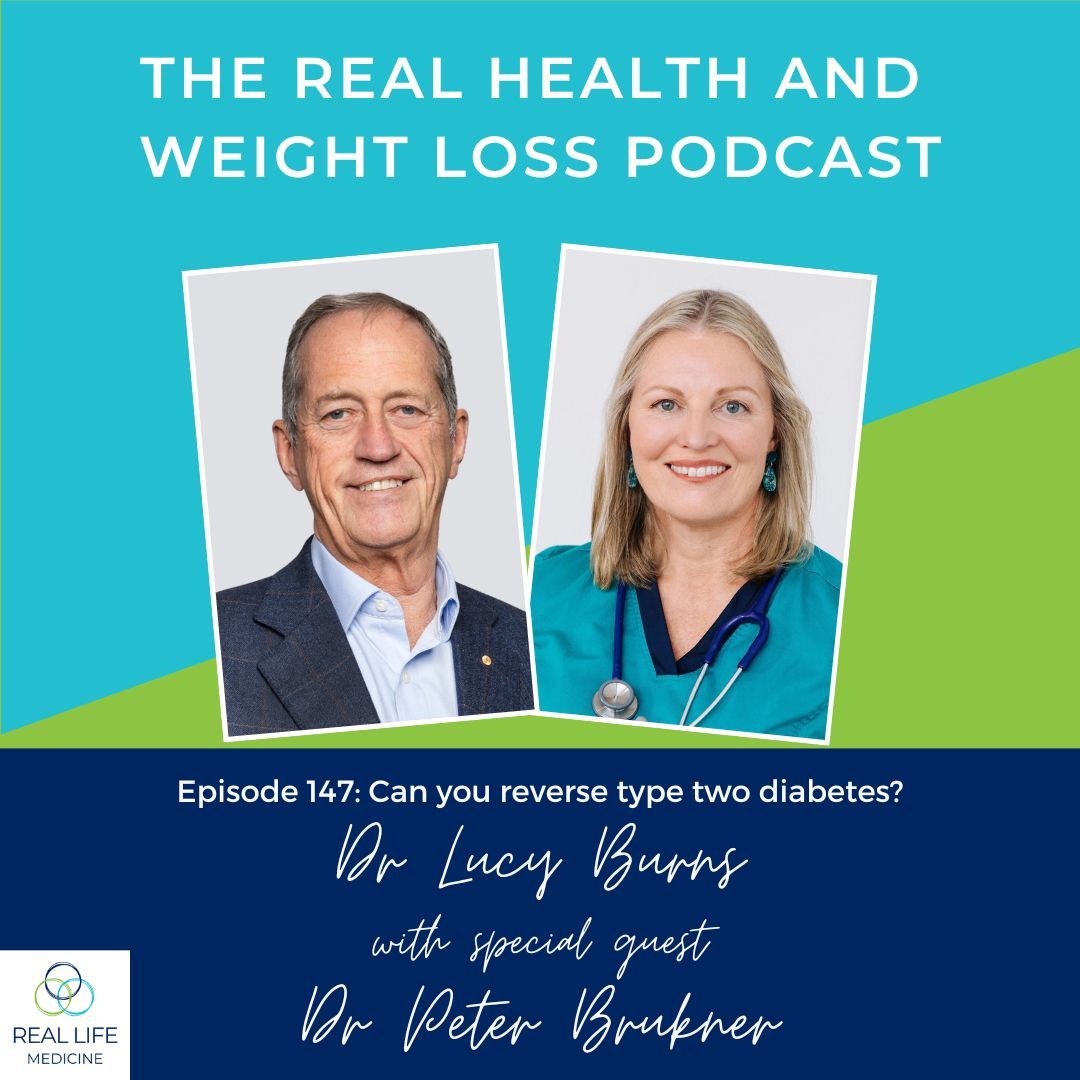
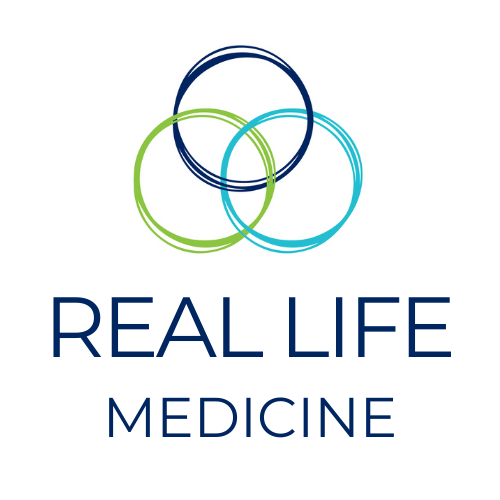
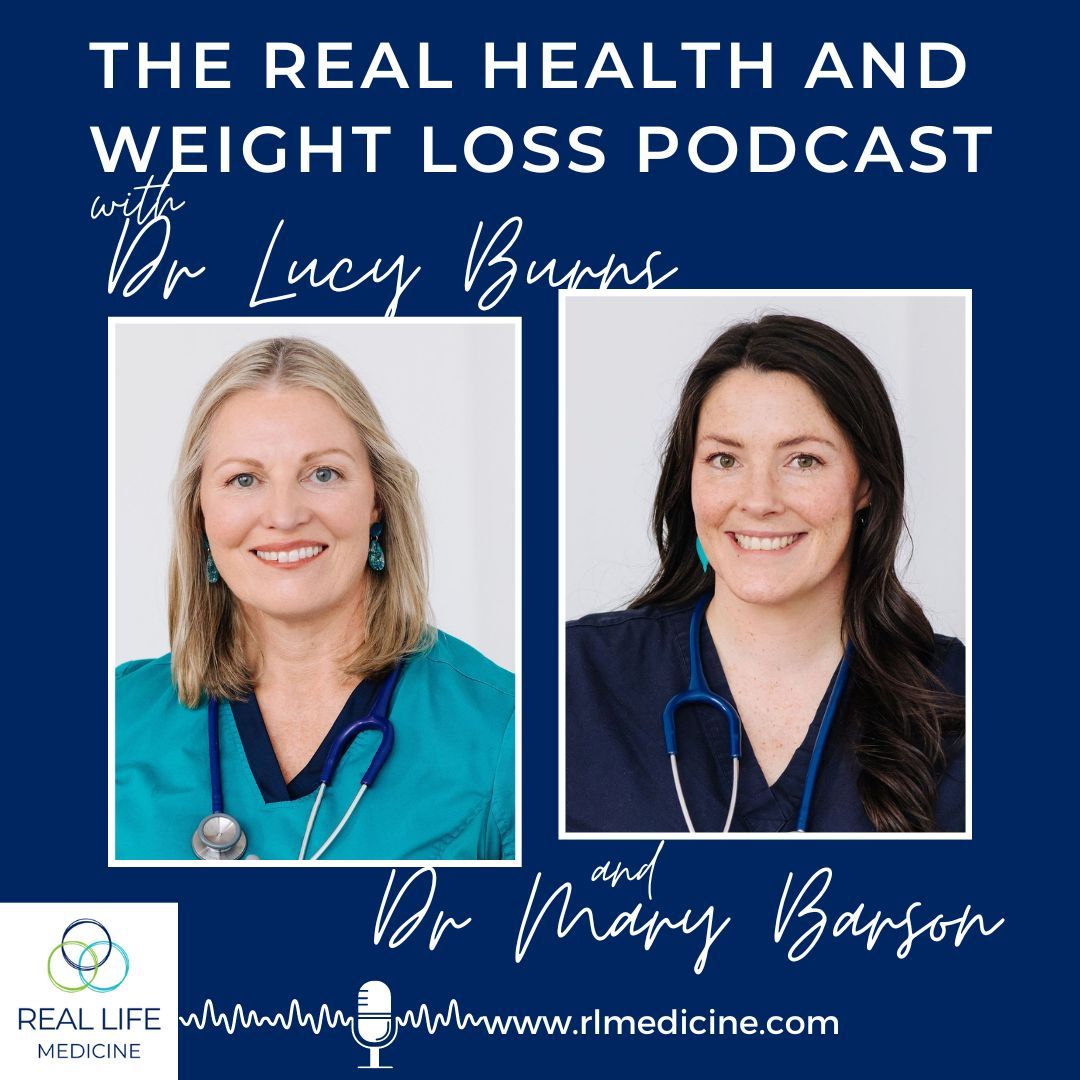
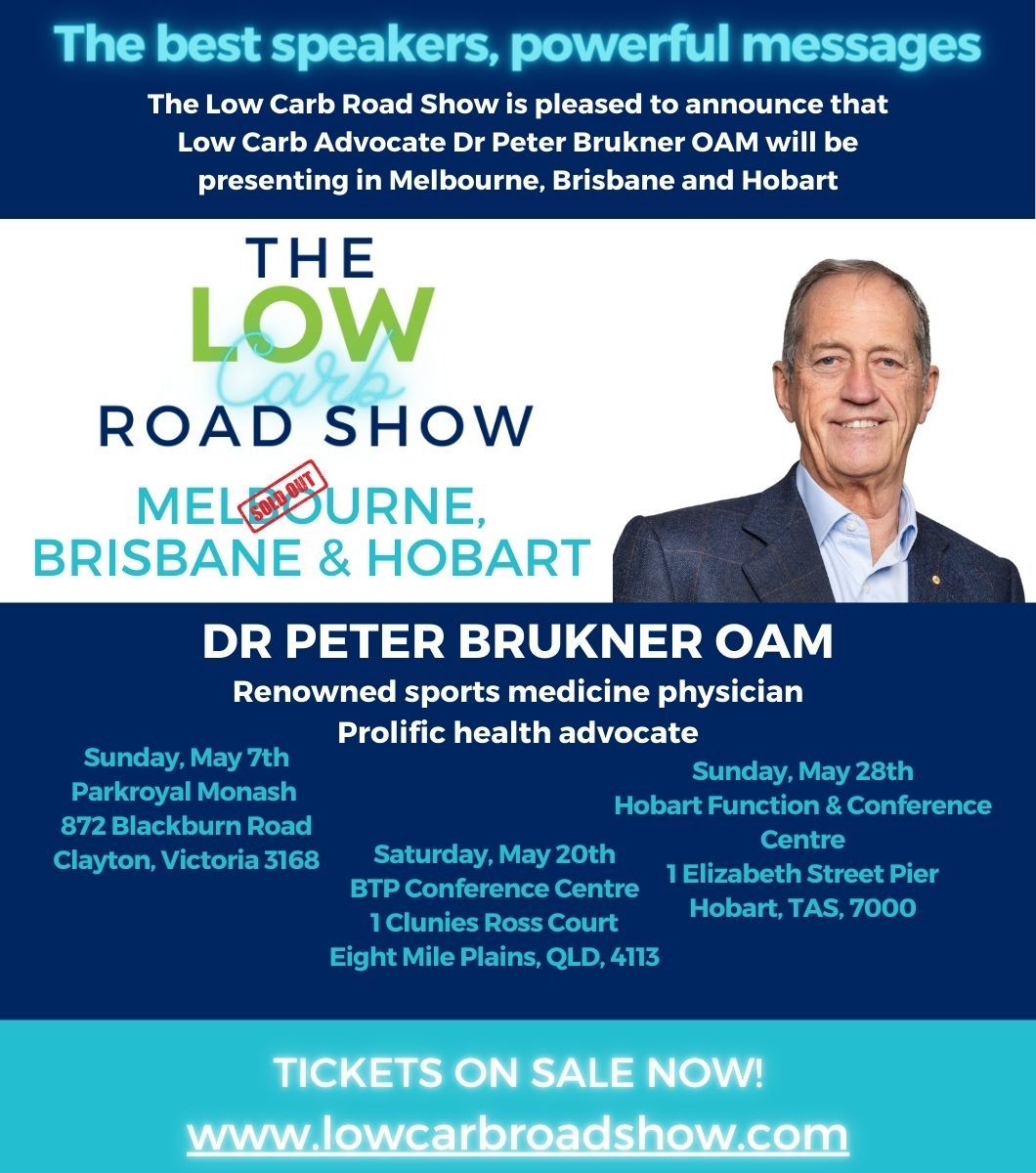
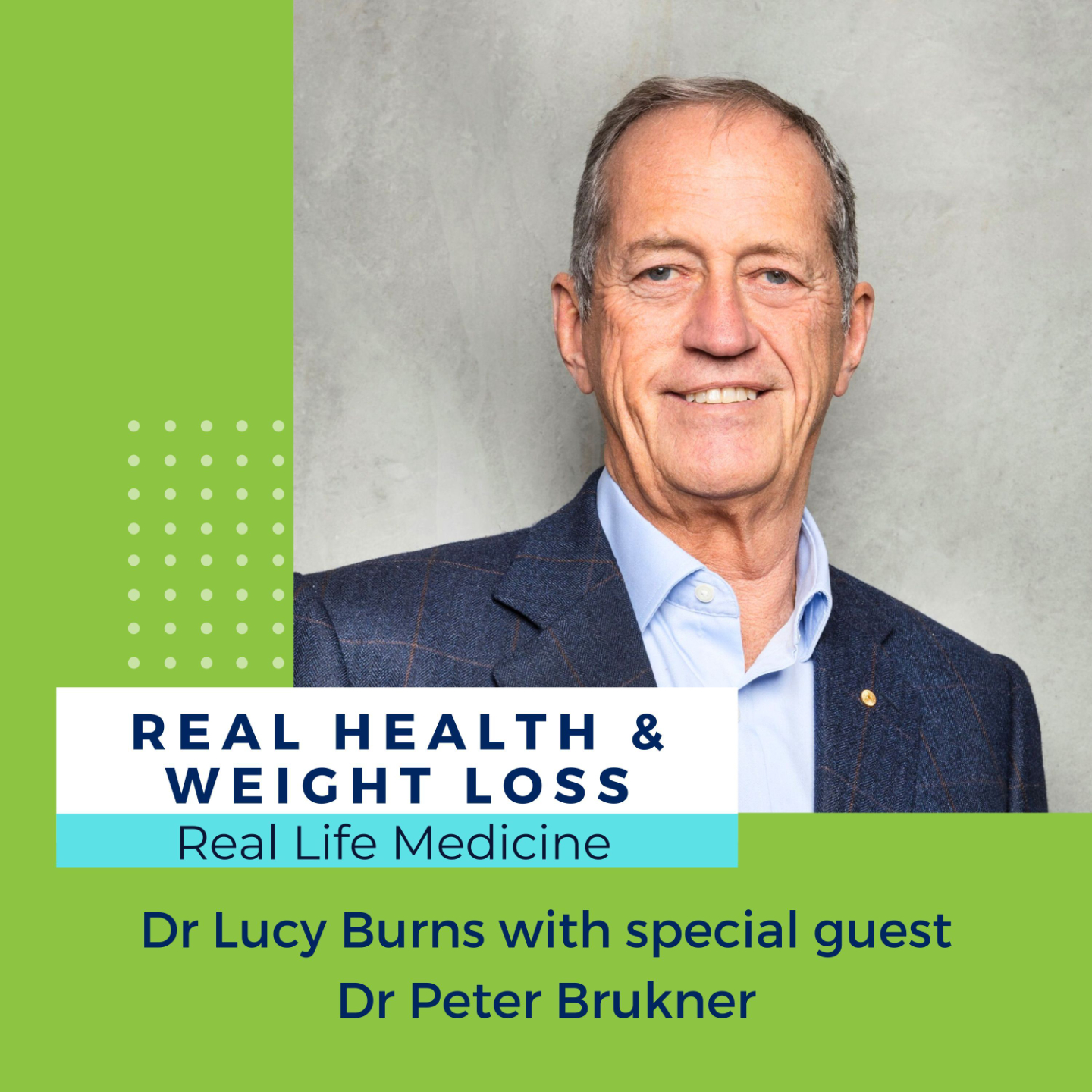
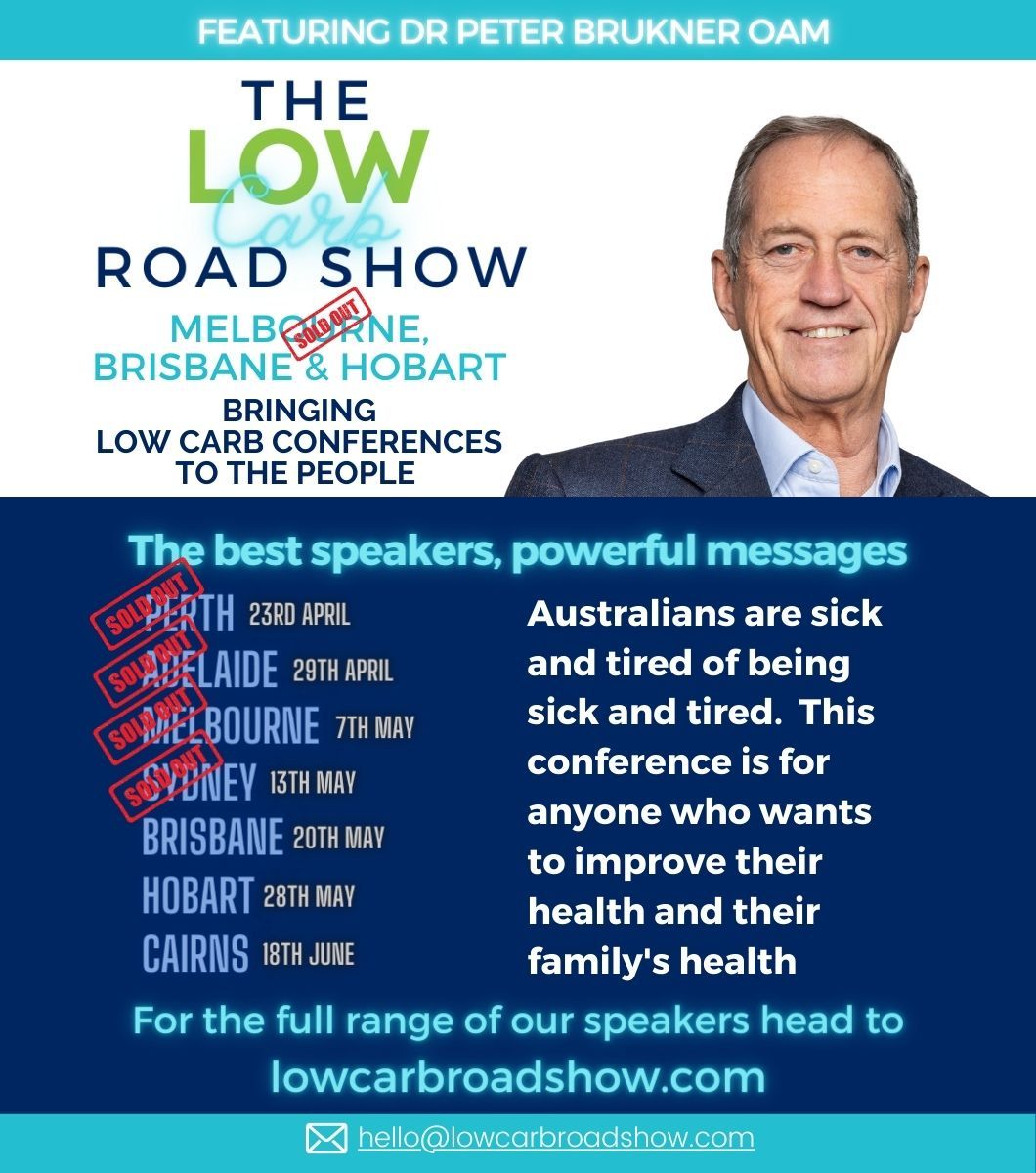
Episode 147: Show Notes
Journey to low carb advocate: Enjoy a recap of Dr Brukner’s personal health journey from being metabolically unwell with a fatty liver, on his way to diabetes, to resolving all these issues with low carb real food. He gives an overview of his career, from prestigious roles as team doctor and head of Sports Medicine for national and Olympic sporting teams, as well as growing his own sports medicine clinic in Melbourne.
Salaries and calories: Dr. Brukner explains how reading Gary Taubes' book "Good Calories, Bad Calories" transformed his life. He was amazed to learn that the widespread adoption of low fat diets over low carb diets was not backed by scientific evidence, but instead driven by the familiar forces of money, politics, and power. Armed with this insight, he conducted an experiment on himself, altering his health trajectory and shedding weight while successfully reversing pre-diabetes and fatty liver.
Much more than a touch of sugar: The phrase "a touch of sugar" is often used to refer to type 2 diabetes, but it belies the seriousness of this chronic condition. Unfortunately, the term is insufficient in conveying the full extent of the disease and its impact on individuals and society. Type 2 diabetes is often overlooked as a major health concern because it is not directly fatal. However, as Dr. Brukner points out, it can lead to severe and life-altering complications such as blindness, amputations, dementia, Alzheimer's, kidney disease, and heart disease. While type 2 diabetes may not be fatal in and of itself, it can and does lead to other chronic conditions that can significantly diminish our quality of life.
Hiding in plain sight: People are suffering terribly from conditions they don’t understand, as they have been misled by both marketing and medical advice into believing they are consuming a healthy diet. But in reality, the vast majority of processed food products have been laced with sugar, leading to a society addicted to sweetness. To add to the confusion, sugar is marketed under a variety of names, making it challenging for us to accurately gauge our sugar consumption.
Changed my life: Although a reluctant bearer of his role as a public educator and advocate for low carb real food, Dr Bruker feels he has been fortunate to inspire people, and has found it to be an incredibly fulfilling experience. In his medical career, nothing has been as gratifying as guiding people towards a healthy diet and observing the positive transformations in their lives. It's truly amazing to witness the profound impact it has on people. The phrase "changed my life" is something he hears time and time again.
A Fat Lot of Good, Dr Brukner’s bestselling book:
https://www.fatlotofgood.com.au/
Defeat Diabetes program:
https://www.defeatdiabetes.com.au/
Buy your tickets to Low Carb Road Show Brisbane or Hobart to hear Dr Brukner in person!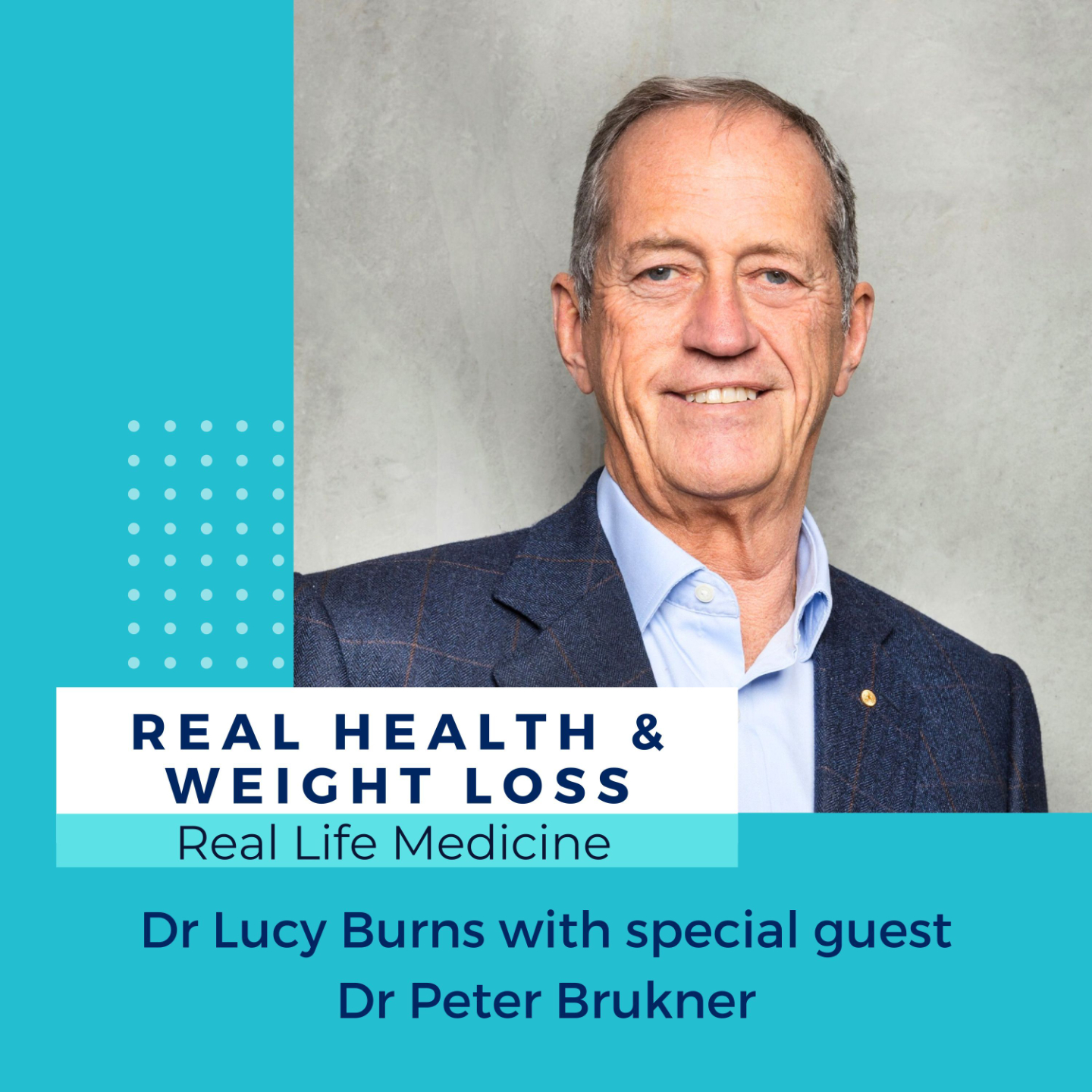
Transcription:
Episode 147
Dr Mary Barson: (0:11) Hello, my lovely listeners. I'm Dr Mary Barson.
Dr Lucy Burns: (0:15) And I'm Dr Lucy Burns. Welcome to this episode of
Both: (0:20) Real Health and Weight Loss!
Dr Lucy Burns: (0:23) Gorgeous listeners. I'm here today with another legend in the low carb space. A person who I have long admired and listened to, and a wealth of information. But you know what, not just information, because information sounds boring, he presents it in a way that is entertaining. So I'm sure today you're going to love listening to Dr Peter Brukner, who is, as I said, a legend in the low carb space. But more importantly, has two things that he's passionate about, his charity called Sugar by Half, and his program called Defeat Diabetes. Welcome to the podcast Pete.
Dr Peter Brukner: (0:59) Thanks for having me Lucy.
Dr Lucy Burns: (1:00) You're welcome. You're welcome. So I thought look, I'm hoping most of our listeners will have heard of you. But in case they haven't, or in case they don't know your whole story. Give us a little bit of background on who you are and how you found your way to low carb.
Dr Peter Brukner: (1:14) Okay, yeah, we all have different journeys, don't we? So, so my background is totally different. I mean, I'm a sports medicine physician. So basically, I've spent the whole of my career really looking after athletes, both you know, elite athletes, but more commonly just everyday people who injured themselves. So I've had a sports medicine clinic in Melbourne for the last 30 years or so. And it's grown to be the largest one in the country. And I've looked after a whole bunch of different sporting teams over the years from AFL teams, to national sporting teams, national swimming, athletics, hockey, soccer. I did a couple of Olympic Games with the Australian team, did a World Cup soccer campaign and tournament in South Africa in 2010. After that, I went to Liverpool, England to work with the Premier League club there for a couple of years as their head of Sports Medicine, Sports Science, then did five years with the Australian cricket team, as their team doctor travelling around, 51 tests in a row and had an amazing time with that. I have to point out that I did finish prior to their little indiscretions in South Africa. So clearly, they were missing my moral guidance there. But, and since then, I've sort of wound down my sport. Because I developed a probably an even more important passion, and that was nutrition. I had dabbled in nutrition years ago, I actually co authored the first sports nutrition book in Australia with a dietitian, and that's, you know, way back years ago, and, and then I sort of, you know, lost a bit of interest in nutrition. Sports nutrition got pretty boring, you know, it was just all about carbs, and Gatorade, and Powerade, and all that sort of stuff, and pasta parties and art before the marathon thing. So, but about 10 years ago, I had a sort of like a bit of a life changing experience. I'm good friends with Tim Noakes, we've known Tim for many years. And Tim started talking about, as many of your listeners know, Tim has been a real pioneer in this whole low carb, healthy fat, sort of diet side of things. And Tim, you know, started coming out talking about this. And I thought, Tim, come on, you know, you finally have lost the plot, mate. You know, it really, you know, this is just one step too far. But, but Tim is a super smart guy. And he's actually challenged a few of the sort of tenets of sports science over the years. And he's been proven right every time. So I thought, No, no, I need to look into it. So I read a book by Gary Taubes called Good Calories, Bad Calories. And I guess, you know, in a way, that was the book that changed my life really, because not only did it talk about the relative merits of, you know, fats and carbs, but it talked about the politics, you know, of how the low fat movement have won out over the low carb movement, which I'd always assumed was due to, you know, good science and evidence and so on, and turns out to be due to the usual combination of money, politics and power. And that really blew me away. And I remember sitting there, sitting on the edge of my bed in Liverpool, and having just read, you know, a chapter of that book and thinking, No, it couldn't be, we couldn't have had this whole thing wrong for 40 years. The whole of western society been on a low fat diet. And here’s this book suggesting that it's all based on rubbish. I found it quite disturbing. And anyway,to cut a long story short, I decided I'd do a little experiment of my own, decided I'd do a three month sort of pseudo scientific trial of you know, weighing myself, getting all my bloods done and things and and that, that just had a dramatic effect. I was quite overweight. I was probably borderline obese. I had a fatty liver for years, I had a strong family history of type two diabetes. I had high triglycerides and high insulin. I was, you know, while if you'd asked me how I was, I’d have said, Yeah, I'm fine. You know, but clearly, I was metabolically quite unwell, and I was, in retrospect, pre diabetic, and I have no doubt that had I stayed the way I was I'd be fully fledged diabetic within a couple of years probably. But anyway, long story short, three months of this diet lost 30 kilograms, reversed all my metabolic abnormalities, my fatty liver that I'd had for 10 years completely disappeared, has gone ever since. All my other abnormalities gone. Felt fantastic, you know, exercised better, slept better, concentrated better. You know, at the end of that three months, you think, Wow, this is unbelievable. So then I guess since then I've sort of become an advocate and a passionate advocate for this way of way of living. I threw myself into it, you know, read everything I can get my hands on and, and started talking about it. And then we started this charity you mentioned, Sugar by Half, with an aim to try and reduce the amount of added sugar that Australians eat. They're probably now about 18, 20 teaspoons of added sugar a day. And the World Health Organisation suggest no more than six. So we've got a fair way to go. So we've got some really good programs for schools and things.
Dr Lucy Burns: (5:56) I was reading a stat that said teenage boys seem to be the highest sugar consumers and are eating 38 teaspoons a day. You know, by the time they're adding in usually,
Dr Peter Brukner: (6:06) That’s pretty scary. Yeah. Oh, you've only got to have a couple of cans of Coke, a couple of cans of Coke. And you're up there, aren't you?
Dr Lucy Burns: (6:10) Yeah, well, even for them. I think they've been marketed to with, with energy drinks. And you know, they're all thinking, all of those things, thinking again, you know, they're all tired.
Dr Peter Brukner: (6:21) Yep. And all full of sugar. Yeah, so we started to Sugar by Half. And that's focused mainly on schools programs. We've got a whole bunch of school lessons that are available for teachers to teach, and so on. So that's been good. Putting my first book out, or first of this, the nutrition books, I've actually written 13 books I think by now. But this is my first of this part was A Fat Lot of Good. Came out about four years ago, and it sold really well. And then we started our Defeat Diabetes program a couple of years ago. And that's been going along nicely. And just recently put out my latest book, which is The Diabetes Plan, which is basically everything you need to know about tackling type two diabetes.
Dr Lucy Burns: (6:59) Yes, which is a brilliant book, and certainly anybody that has type two diabetes or has anyone in their family, or even if you have a family history, basically, it's like, every family should have this book. Because we know that the rates of type two diabetes are skyrocketing. It's more and more common. It's an expensive disease, not just for the community, but for the individual, they end up on multiple medications, and it really impairs life quality.
Dr Peter Brukner: (7:28) Yeah, it's all those complications. I think one of the reasons I mean, type two diabetes is basically ignored. I mean, I don't know why. I think it's the biggest single health issue in our country. I mean, there's, there's 2 million Australians with type two diabetes. You know, 2 million! And probably another 2 million with pre diabetes. So if you look at the over 40 population, which I calculated the other day, I think was 14 million. So 4 million out of 14 million, you know, is a pretty substantial proportion of the population. And my feeling is, I'm often sort of wondered why, why, you know, it's sort of relatively ignored in the in, like, we've had, you know, a pandemic that stopped the whole world for the last few years. And yet, you know, arguably, type two diabetes is an even bigger issue, but which we've ignored. But I think it's because people don't die of type two diabetes. But what people don't realise is that, you know, type two diabetes is the major, major cause of most chronic diseases. It’s a major cause of blindness, a major cause of amputations, major cause of dementia, and Alzheimer's, kidney disease and heart disease. The biggest single factor in all these diseases is type two diabetes. So it might not kill you itself. But it will lead to all the chronic diseases that we've, you know, just so prevalent in our society. So we've got to attack that root cause, which is just the type two diabetes. And because as you know, I mean, if you have high blood sugar, which is what, what happens in type two diabetes, that damages the lining of arteries, and as we know, you know, arterial disease is the cause of all those diseases. So, it's not surprising, but it just goes under the radar and I just, you know. It frustrates the hell out of me that no one's talking about it. And I guess that's why, I kept waiting for someone else to sort of start jumping up and down about it and nothing happened. So I thought, Oh stuff it I better do something myself. So hence the program and the book.
Dr Lucy Burns: (9:17) It's, it's interesting, isn't it? And I think there's a little phrase that goes around where people are told you've got a touch of sugar. I've just got a touch of sugar! It's just, not a touch of sugar.
Dr Peter Brukner: (9:31) No, and the other thing is that people don't understand that sugar is everywhere. They think sugar is putting two spoons of sugar in your cup of tea or a cup of coffee. And yeah, the number of people that say to me, Oh, I don't I don't eat much sugar. And then you go through their diet and you know, they have fruit juice and they have cereal and they have honey and jam and you know, so you know, before they've left home in the morning, they've already had more sugar than they should have had the whole day. And all those processed foods, just about every processed food contains sugar. You know, people have no idea. Things that we always thought were healthy like, like fruit juice.
Dr Lucy Burns: (10:04) Processed food industry is so sneaky because they can just, you know, they renamed their sugar. They don't call it sugar. It's got 50 other names.
Dr Peter Brukner: (10:13) Yeah, breakfast cereals. Yeah, brilliantly marketed, you know, but they are basically just cereal flavoured sugars. But, you know, little Johnny's walking on the supermarket aisle with mum and there's this brightly coloured, you know, animals and then, oh Mummy Mummy, I've got to have that. And they're very good at it. And things like fruit yoghurt, and muesli bars and barbecue sauce and all these things that people are totally unaware are just full of sugar. So yeah, it really is, sugar is everywhere. And, and it's all about that processed food really, you know, processed, ultra processed food. I mean it didn't exist a generation or two ago, and neither did most of these diseases. And, you know, I think the stats now, that we get something like 60% of our salaries, oh our calories, from, ultra processed foods, you know. So we've just got to get back to eating real food. That's, you know, that's a trick, isn't it?
Dr Lucy Burns: (11:03) Absolutely. And your slip of the tongue there on the salaries versus calories is actually probably a headline, because the processed food industry is making a bucket ton of money at the expense of our health.
Dr Peter Brukner: (11:17) And they don't care. Yeah, I mean, they're not worried about our health. You know, all they're interested in is profit. And they're brilliant at it. The processed food industry has basically got us all addicted to sweetness. And, you know, they just crank up the sweetness level on all the foods to the bliss level that they're tasters decide on, that's the ideal amount of sweetness, and away they go. It's a bit of a stretch to even call them foods, you know, I mean, they're really sort of chemical concoctions that are dressed up to look like food. You know, there's no nutrients in them. I mean, you know, we eat food for nutrients, you know, and, and most of these processed foods, you know, unlike real foods like meat and fish and fruit and veg and, and so on, which are full of nutrients, you know, all sorts of different nutrients, these processed foods are devoid of nutrients. And all they do is, is satisfy your sort of immediate hunger. Tastes very nice. They're very cheap, most of them. So it's very attractive. And then two hours later, yeah, they make sure you're hungry again, because there's no actual nutrition in there. And so away we go again, you have another snack, and then you have another meal, they have another snack and away we go. And the food industry again, you know, have hijacked the dietitian, and the pharmaceutical and medical industry, you know, they've got us all convinced that everything in moderation is fine. They've got us all convinced, you've got to have lots of small meals every day, they have got us convinced that breakfast is the most important meal of the day, all these sort of myths of which there is zero evidence for them. But you know, the average punter out there believes them because they've been so well marketed. And, you know, I mean, much as I hate to admit it, I sort of half admire them, you know, they're incredibly good at, at the marketing. I mean, they've basically managed to con the whole world into giving up real food and taking up this rubbish. I mean, you've gotta, that's a pretty good effort.
Dr Lucy Burns: (13:10) Ah, absolutely. And in fact, I reckon the master of that is the product Up and Go, who convinced us that not only do we not have time to make breakfast, we don't have time to eat it. So just drink this product, and you will get all your, all the requirements that you need for a healthy breakfast. And so people are drinking it or feeding it to their kids and it, it's a disaster,
Dr Peter Brukner: (13:36) Horrible stuff. Horrible stuff, you know, there's nothing healthy in it at all. And it's got, you know, it's got a four star rating or something like that. I mean, that’s a joke too. Again that's been hijacked by the food industry. And, you know, I mean, it's basically letting the fox into the hen pen isn't it? I mean, it's just, you know, yeah, it's a real issue. And, you know, we've got two choices Lucy, you know. We can either sort of sit back and accept it and accept that we're just going to get fatter and sicker as time goes on. And then people complain about the cost of health and all that sort of stuff. Or we can have a crack at it. And, and there's people like yourself, who are out there spruiking it and doing a fantastic job, and we just got to be more, more people doing the same thing.
Dr Lucy Burns: (14:16) Yeah, absolutely. And I think, you know, again, there's a disconnect between people and food, medicine and food. And you know, Mary and I are always talking about real food is medicine. It kills me, there's actually a doctor in the UK, who's written a book called Food is Not Medicine. Interesting. Oh, my God, seriously?
Dr Peter Brukner: (14:36) Yeah. Well, you know, I'm sure it's funded by someone that, you know, because they’re interested in that, in that line. Now, that's the other thing is, you know, all the food research and so on. I mean, you know, and all the dietary, I mean most dietitians now are employed by the food industry so that you know, they're not going to bite the hand that feeds them, you know, I mean, of course. So they've basically just bought off the whole food industry, you know, dietitians and and a lot of doctors, if they haven't already been bought off by the pharmaceutical industry. So it's a nice little thing, isn't it? Yeah, like eat crap food and then you'll, you'll get sick and you'll need my drugs. So it's a nice little combo, the old food and pharmaceutical industries. Two of the most ruthless, profit seeking, you know, industries that you could find and neither of whom have any interest in people's health and, you know, just purely interested in profits for their shareholders.
Dr Lucy Burns: (15:28) Absolutely. And it's interesting because I will use, in my brain when my brain suddenly sort of decides that it might like to eat a packet of Tim Tams, I will remind it that it wants to do that, because it's been marketed to. Because that product has been engineered to reach my bliss point. Because I've been told it's going to make me feel good, because it's an iconic biscuit legend that I've been conditioned to believe is, you know, amazing. And it's all a bit of a yes.
Dr Peter Brukner: (15:55) Yeah, yeah, I used to love Tim Tams. They were always a treat, you know, especially out of the fridge, I used to like them in the fridge. You know, they were cold, you know, they were good. But you know, I’m as guilty, you know, for 60 years of my life, I was as guilty as anyone of being sort of seduced by all this nonsense and this propaganda. And, you know, I was a sucker. So really, yeah, I'm sort of trying to make up for lost time here to be honest. But yeah, they certainly had me conned, there's no doubt about it. And I'm just very grateful that someone like Tim Noakes decided to point it out to me because it's changed my life. And I've been able to influence a few other people as well, which is very rewarding. I don't think I've ever done anything in medicine as rewarding as getting people onto a good diet and seeing the changes that makes for them, you know. You get incredible feedback, and you see the changes, and the number of people, I'm sure you have this all the time, you know, you and Mary, Lucy that, you know, people contact you and say, you know, it's changed my life. That term, changed my life, you hear that time and time again. And the tragic thing is that it's such a small minority, and the rest of people are just blissfully ignorant of what's going on. And until it's too late, you know, I mean, we, we don't develop type two diabetes, you know, when we're 50, you know. We start developing it when we're 30, you know. And it's, it's a lot of long, hard work to get there. I mean, you know, you've gradually got to become insulin resistant, and, you know, surely we're better off, you know, tackling it at the start, and that's what disappoints me about, about governments, about medical bodies, about the dietitian industry and so on. I mean, you know, there's such an opportunity there to educate the public and to institute, you know, things like, you know, like taxes and advertising restrictions, and, you know, education in schools, and there are so many things we can do, that would have an impact. And yet, you know, again, the food industry is just too powerful, and there's no government, or profession that's strong enough to stand up to them, unfortunately.
Dr Lucy Burns: (17:57) No, I know, and it's, you know, often we've talked about the idea, because people, I sometimes think people are blown away by the idea that the government aren't actually looking after them. And it's like, Well, the problem we have is that the government's job is to stay in government, that's their idea of the job, and the food industry and the pharmaceutical industry, both fund and sponsor, the governments of the day, and so if you actually stop, that means your opposition will get double the funding, and they're going to beat you out.
Dr Peter Brukner: (18:27) Yep. It's a sad reflection on our society. And, you know, I don't know what we can do about it, you know, just keep, keep chipping away, and, and to keep producing the evidence, you know, because, you know, the, the one thing we've got on our side is the science. But unfortunately, there's so much corrupt science out there, too, that, you know, paid for by drug companies and food companies and so on, and they get the results they want, you know. But sometimes I just think that, you know, we're bashing our head against a brick wall, it’s a waste of time. And then other times, I get a message from someone saying, you know, you changed my life. You think, okay, all right. I'll keep going for another week.
Dr Lucy Burns: (19:05) Yeah, keep going. Yeah. And you know, what it is, it's interesting, I mean, people, people connect to people. So if there's people like you out there who are in the public, who are engaging, who people want to follow, then that's how we change things. I know the science is clearly important, because then as AHPRA regulated doctors, we have to have evidence for what we're recommending. But most of the public don't care that much about the science, you know, they start reading things and turn off. So it's really therefore I think about getting out there into the community, as you do so very well. And talking to people and inspiring them with stories.
Dr Peter Brukner: (19:48) Yeah, look, I think I mean, to be honest, you know, I'd rather not do all that. I mean, believe it or not, you know, but I guess as many people have said to me, and I get it, so I've got a bit of a profile through my sports sort of thing, and I can leverage that profile, maybe into getting a bit more sort of publicity and promotion for this sort of thing. So I'm obviously happy to do that, because you do whatever it takes, but it shouldn't be me. You know, I mean, I mean, I'm a sports medicine doctor, you know, I mean, I shouldn't be talking about type two diabetes. I’m sure the diabetes specialists are probably saying, you know, what does this guy know about, you know? But someone's got to, you know, and it's got to be people like us, you know, who are doing it. And that's why this Road Show is fantastic. And, and you know, your program. And you know, we've all just got to do what we can do, you know. And I'm, you know, I'm just doing my bit with that I can write and I can speak, so I think, Okay, well, I'll write and speak. You guys are fantastic at the sort of, you know, running programs and so on. That's what you do well, you know, we've all just got to do whatever we can do to contribute to the, to the cause, I guess.
Dr Lucy Burns: (20:50) Yeah. Yeah. And I think you're right. I mean, at the end of it all, the bit of medicine that I found soul destroying, and and, you know, I had a little chat with Gary Fettke earlier, and he found soul destroying, chopping people's feet off, like, that would be an awful, awful job. And I know James Muecke, seeing people go blind, you know, and for me, it was just doling out scripts, because that's the medical model that we've got. It's short, short consultations, high turnover. You've got this, right, now we need to add this medication, just adding adding adding, you're never actually making people, nobody ever came in and said, Gee, Doc, after those five pills, I feel fantastic. Like no one said that. But people would come in after, you know, doing three months or even less, like six weeks of low carb and go, Oh, my God, I feel amazing. You go, Yeah. Isn't that amazing?
Dr Peter Brukner: (21:39) Yeah, it's certainly the most rewarding medicine that I've ever done. And, and, you know, nobody ever thanked me as much for fixing their knee or their ankle. Compared to, compared to this, you know, and, and it's so many different areas of medicine, you know, it's not just diabetes, or not just weight loss. I mean, I had someone come up to me recently, and thanked me for getting their husband who had bipolar, you know, off all his medication, you know, and said, you've changed my life, you know, you change our lives. And you think, Wow, I mean, they'd tried every drug possible, and so on. And people with arthritis, and epilepsy, and Parkinson's, and you know, all these sort of things that aren't really talked about much in as a potential for low carb. I mean, it makes a huge difference to people and mental health. I mean, there's more and more evidence now that diet is a major factor in mental health, and, you know, all these things are just becoming more and more common in our society. And as our diet gets worse, and worse, our chronic diseases get worse and worse. And, you know, hasn't anyone put, you know, one and one together? And you got two, you know. I mean, it's pretty bloody obvious that diet is a major factor in why we have so much chronic disease and, and the sooner we acknowledge that and do something about it, the better. But for some reason, and I think it's, it's partly ignorance, you know, I think I mean, I don't know about when you did medicine Lucy, it was long after me, but, you know, I don't think I got a single lecture in nutrition in my medical course. A bit of biochemistry and things, but nothing about actual food. And so doctors don't know anything about nutrition. And then the public assume they do. And they, they really don't, and you stick to your comfort zone. And you know, as you mentioned, a doctor’s comfort zone is writing scripts, handing out drugs. A, they don't have the knowledge and B, they don't have the time to sit down and take someone through, you know, their diet and so on. Because that takes time and they don't understand it. So in a way, it's sort of ignorance really, that the medical profession just don't get diet, and exercise and other sort of areas. It's all just, we're just trained to write scripts. That’s basically all we do.
Dr Lucy Burns: (23:45) And I think part of the problem is that traditional diet was low fat, low calorie. I mean, that doesn't work. It's unsustainable, it's unpleasant. Nobody likes it. And then people go, Oh no one wants to exercise. So they do a little tip of the hat, which is, Well, of course, you've got to go and diet and exercise, then they move on to their spiel. And it's, you know, I often say, diet and exercise if you're using it as eat less and move more, can be unhelpful, but at its crux of “eat better food and move a bit more often,” that can be miraculous.
Dr Peter Brukner: (24:23) Oh, absolutely. It's funny, you know, people often sort of say, oh, you know, you've got to exercise to lose weight, but sometimes you actually got to lose weight to exercise. You get on to a you know, a good healthy diet, you know, you actually feel better. So you have more energy, you are a bit lighter and so, I did a lot more exercise after I lost my weight than I did beforehand because it was just much more enjoyable. I felt like doing it, you had energy and so on. So I think sort of diet comes first, and then that encourages you to exercise. And that whole thing of you know, you can't outrun a bad diet you know, I mean that you know, you can run all you like or do exercise but if your diet is rubbish, then, no good. And I think you're right. I think, you know, those low calorie diets have probably given dieting a bad name, you know. People sort of, because as you said, you know, I mean, I defy anyone to last too long on 800 calories a day. I mean, it's just, you get hangry, you get hungry and angry, and it's just not sustainable. And, and so you do that for a while, you know, you lose a bit of weight, you know, it's effective, you know, but, you know, you give up, you then put on more weight, you finish up being heavier than you were. You yo yo diet and so on. And people say, Oh, nup, diets don't work. Well. That's not right. Because the great thing about you know, sort of reducing carbs and focusing on healthy fats and proteins is that you're not hungry. You know, and because it's carbs, it makes you hungry, and it's protein and fat that fill you up. That was the very first thing I noticed when I went onto the diet, I stopped being hungry. You know, instead of having your cereal at eight o'clock in the morning and getting to 10.30 and thinking, Oh Christ, is it lunchtime yet? It’s sorta, you'd have bacon and eggs and avocado and you wouldn't eat again all day. And I went from eating three meals and three snacks a day to eating two meals a day. Which Ii do to this day. And so hunger is a huge underrated sort of issue, I think and you know, carbohydrates are made to make you hungry. You have that burst of blood sugar, and then it drops and, Oh I’m hungry again, you know, so of course, I'm going to eat every two or three hours. Which suits one particular industry, doesn't it?
Dr Lucy Burns: (26:26) Absolutely. I was never a person that liked breakfast. But whenever I was, you know, on a health kick, I would have breakfast because you know, that was what you're supposed to do. And without fail, without fail, I would be then hungry at 10am. Whereas when I didn't have my breakfast, I wasn't hungry till lunchtime. But I felt guilty skipping breakfast because, you know,
Dr Peter Brukner: (26:49) Oh most important meal of the day! Very important, according to according to Mr Kellogg and Co.
Dr Lucy Burns: (26:54) Yeah, yeah. Lovely peeps. Peter is speaking at a number of the low carb conferences, including Tasmania, Melbourne, Sydney, and Brisbane. So if you would love to come and meet him, listen to his talk, you can come to any of those conferences. But more importantly, and you know, he's just released a new book. It's fantastic. And as I said, I really think it should be just like a book in everyone's house. So you know, lots of people have, they buy those books when they're pregnant. I remember buying, you know What to Expect When You're Expecting and that sort of still sits on my shelf somewhere. And this is really one of those books. It really, our epidemic of diabetes is massive. It's not going away anytime soon, but this book will help revolutionise your life.
Dr Peter Brukner: (27:41) Well, thanks for that Lucy, and I must admit, I'm really looking forward to the Low Carb Road Shows. They'll be terrific events. I always learn a heap of stuff myself, and hopefully I can send some messages out there as well. So I look forward to meeting everyone there. And that's, that's the best thing about it, is the people you meet, you know, it's such a great group of people that come along and always love chatting and chatting afterwards and over lunch and things like that. So I'm looking forward to it.
Dr Lucy Burns: (28:05) Wonderful, wonderful. Lovelies, we will have the links to Peter's book in the show notes as well as the Defeat Diabetes program. Again, another brilliant program. If you have type two diabetes, or certainly a family history of it, just crack on and have a look at that. Lovely ones. Have a beautiful day today and I will talk to you all soon. Thanks very much.
Dr Lucy Burns: (28:31) So my lovely listeners, that ends this episode of Real Health and Weight Loss. I'm Dr Lucy Burns…
Dr Mary Barson: (28:39) and I'm Dr Mary Barson. We’re from Real Life Medicine. To contact us, please visit rlmedicine.com
Dr Lucy Burns: (28:49) And until next time…
Both: (28:51) Thanks for listening!
Dr Lucy Burns: (28:53) The information shared on the Real Health and Weight Loss podcast, including show notes and links, provides general information only. It is not a substitute, nor is it intended to provide, individualised medical advice, diagnosis or treatment, nor can it be construed as such. Please consult your doctor for any medical concerns.







